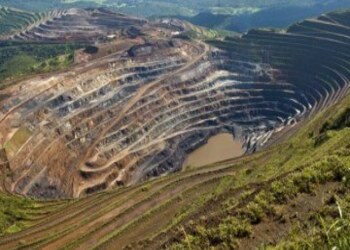The Brazilian agency that inspects mining sites and seizes illegally mined ore is vastly understaffed, a consequence of a government that has given free rein to the mining sector.
On March 2, O Globo reported that Brazil’s National Mining Agency (Agência Nacional de Mineração — ANM) currently employs just 250 inspectors to monitor some 35,000 mining sites across the country. Field inspections also have been severely curtailed, due to health risks of traveling to COVID-19 hotspots.
SEE ALSO: Brazil’s Dirty List – Not Making a Dent in Modern Slavery
The ANM is tasked with ensuring that legal mining companies stay within their production quotas and use approved technology to extract minerals, including iron ore, copper and gold.
Debora Puccini, director of the ANM, told O Globo that its inspectors also work with police to shut down illegal mines but that such operations are quick to reappear once authorities have left the area.
Puccini admitted that greater enforcement efforts are needed, before adding that the agency hoped to use drones and satellites to complement monitoring efforts.
InSight Crime Analysis
Under-resourced, Brazil’s mining agency faces an uphill battle, given the sheer size of the country’s mining regions and the efforts by its President Jair Bolsonaro to ease mining regulations in protected regions.
The country’s national parks — in which environmental crime is rife — cover some 25 million hectares. In the Brazilian Amazon alone, more than 450 illegal mining sites have been uncovered, according to research by the Amazon Geo-Referenced Socio-Environmental Information Network.
SEE ALSO: Brazil Cracking Down on Rising Illegal Diamond Mining
Skyrocketing gold prices and a lack of employment opportunities during the COVID-19 pandemic have also driven up the number of illegal miners operating in Brazil, Puccini previously said.
Conservationists say President Bolsonaro is deliberately handcuffing agencies, like Puccini’s, that protect the environment and natural resources. Brazil’s environmental agency (Instituto Brasileiro do Meio Ambiente e dos Recursos Naturais Renováveis — IBAMA) has seen its budget and staff slashed under Bolsonaro, with employees complaining that the government has hampered enforcement efforts in recent years.
The Ministry of the Environment’s administrative arm (Instituto Chico Mendes de Conservação da Biodiversidade — ICMBio) also reportedly employs a handful of agents to oversee vast expanses of protected land.
The lack of resources sets these agencies up for failure and corruption. For example, inspectors at ANM are charged with stopping the use of slave labor in mines. But a recent investigation by Mongabay revealed that a family known for using slave labor to mine gold in Brazil’s northern state of Pará had continued to obtain permits from the ANM, despite being caught enslaving workers in a 2018 raid.

